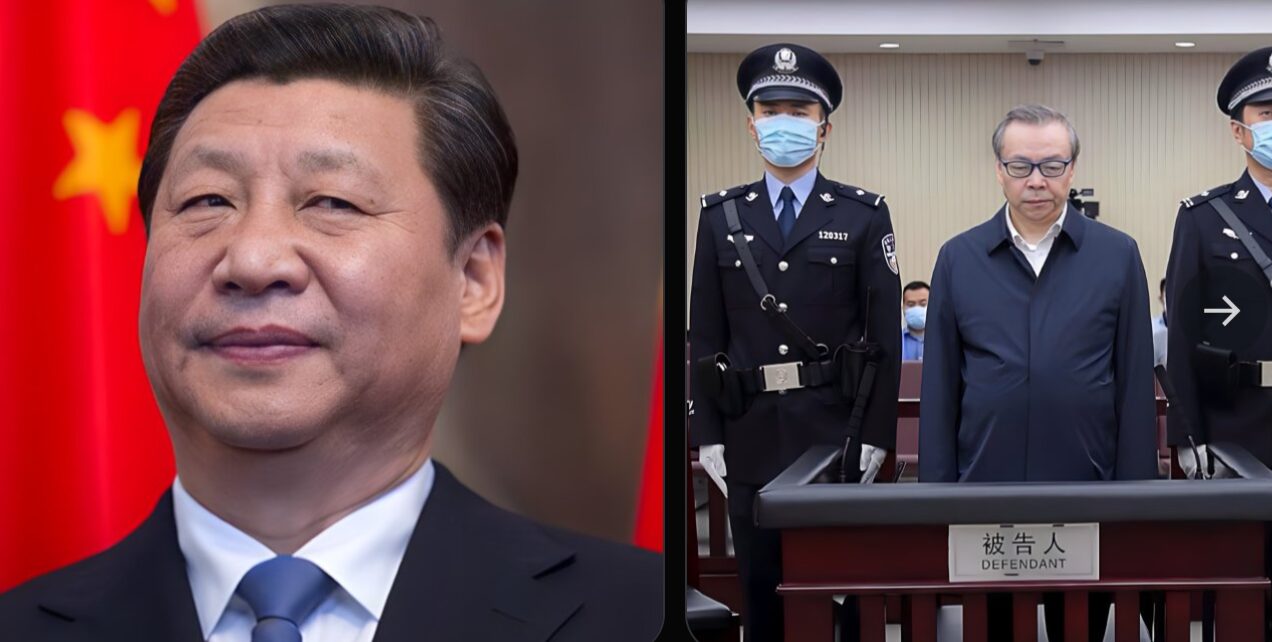CHINA just EXECUTED former state official Li Jianping for embezzling $412 Million
In a dramatic and highly publicized move, China has executed Li Jianping, a former state official, after he was convicted of embezzling a staggering $412 million. The execution of Li, who held a senior position in a state-owned company, has drawn attention both within China and globally, raising questions about the country’s approach to corruption, the rule of law, and the use of the death penalty in financial crimes.
Li’s case is the latest in a series of high-profile corruption scandals in China, where the ruling Communist Party has waged an aggressive campaign to root out graft and ensure officials adhere to strict moral and legal standards. In this post, we will explore the details surrounding Li Jianping’s crime, his conviction, the implications of his execution, and the broader context of China’s ongoing anti-corruption efforts.
The Case of Li Jianping: Embezzlement on a Grand Scale
Li Jianping’s fall from grace has been swift and severe. A former official in a state-owned enterprise, Li was found guilty of embezzling a massive $412 million over the course of several years. The funds were siphoned off through fraudulent transactions, misappropriation of government funds, and other illicit financial practices while Li was in power.
Li’s position within a major state-owned company allowed him to gain access to significant amounts of money, which he reportedly diverted for personal use, including luxury real estate, lavish lifestyles, and bribes to others within the political system. The scale of his corruption made his case one of the most significant corruption scandals in recent years.
His arrest and trial came as part of China’s larger anti-corruption campaign, launched by President Xi Jinping shortly after he came to power in 2012. This campaign has targeted both low-level officials and high-ranking members of the Communist Party, making it one of the most ambitious anti-corruption efforts in modern Chinese history.
The Death Penalty: A Controversial Punishment
Li Jianping’s execution has drawn both domestic and international attention due to its severity. In China, the death penalty is still widely used for a range of offenses, including financial crimes such as embezzlement, bribery, and corruption. While the Chinese government justifies these harsh punishments as necessary for maintaining social order and preventing the abuse of power, there are ongoing debates about the fairness and effectiveness of such measures.
In recent years, China has reduced the number of executions, and there has been some movement towards limiting the scope of the death penalty. However, high-profile cases involving corruption and economic crimes continue to attract the harshest penalties, particularly when large sums of money are involved. Li Jianping’s execution is one of the most notable cases of a high-ranking official facing such a fate.
Critics argue that the use of the death penalty for corruption crimes raises serious concerns about the application of justice in China. Human rights organizations and some legal experts contend that the punishment is excessive and undermines the principles of fairness and proportionality in the justice system. They also point to concerns about the transparency of trials and the possibility of politically motivated decisions.
The Anti-Corruption Campaign: China’s Efforts to Clean Up Politics
Li Jianping’s execution comes at a time when China’s anti-corruption campaign, led by President Xi Jinping, continues to be a central focus of the government’s agenda. The campaign, which began in 2012, has targeted corruption at all levels of government and within the private sector, aiming to crack down on bribery, embezzlement, and other forms of corruption that undermine public trust.
Over the years, the campaign has resulted in the prosecution of thousands of officials, ranging from low-ranking civil servants to high-ranking political figures. High-profile cases, such as that of former political star Bo Xilai, have demonstrated the lengths to which the government is willing to go in order to rid the political system of corrupt individuals.
The campaign has been touted as a success by the Chinese government, with numerous officials arrested, convicted, and sentenced for corruption. However, it has also been criticized for being used as a tool for consolidating power and targeting political rivals. The question remains whether the campaign is truly effective at tackling systemic corruption or whether it serves as a political tool to strengthen Xi Jinping’s control over the government and the Communist Party.
Global Reactions: The Death Penalty in Focus
Li Jianping’s execution has sparked reactions from the international community, particularly from human rights organizations that oppose the death penalty in all forms. Amnesty International and other advocacy groups have condemned the execution, calling it an infringement on human rights and a violation of international legal standards.
The use of the death penalty in corruption cases is particularly controversial, as many believe that such crimes should not carry a punishment as extreme as execution. Critics argue that the Chinese government’s use of the death penalty is an effort to maintain control over its citizens through fear, rather than addressing the root causes of corruption within the political system.
On the other hand, some supporters of China’s actions argue that the country’s use of the death penalty is a necessary deterrent against corruption, especially among high-ranking officials. They contend that corruption in the government has had a devastating impact on the country’s economy and social fabric, and harsh punishments are necessary to preserve the integrity of the political system.
Implications for the Future of Chinese Politics and Governance
The execution of Li Jianping may serve as a warning to other officials in China about the severe consequences of corruption. While many in China may view the move as a necessary step in the fight against corruption, others may see it as a demonstration of the government’s absolute power over the judicial system.
The broader question is whether the execution of corrupt officials will have any lasting impact on the systemic issues that contribute to corruption in China. Critics argue that the root causes of corruption—such as lack of transparency, inadequate checks and balances, and political favoritism—cannot be addressed through executions alone. They suggest that genuine reform of China’s political system is needed to create a more accountable and transparent government.
As for the Chinese public, reactions to Li Jianping’s execution will likely be mixed. Some may see it as a victory for the anti-corruption campaign, while others may view it with concern over the extent of state control over the judicial process.
In Conclusion
Li Jianping’s execution is a significant and controversial moment in China’s ongoing battle against corruption. It highlights both the severity of China’s anti-corruption measures and the continuing use of the death penalty for financial crimes. While it may serve as a deterrent for others in positions of power, the broader impact of such measures on systemic corruption remains uncertain.
The international community’s reaction to the execution will undoubtedly continue to focus on China’s human rights record and its use of capital punishment, raising important questions about the balance between justice, deterrence, and human rights. For China, the case of Li Jianping is another reminder of the high stakes involved in its efforts to clean up its political system, but it also raises critical questions about the effectiveness of such extreme measures in achieving long-term change.

















Post Comment